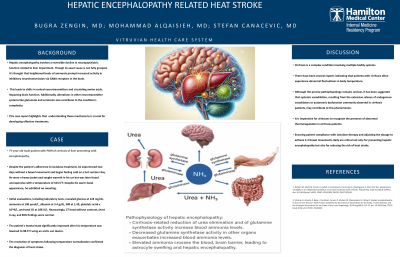Monday Poster Session
Category: Liver
P3023 - Hepatic Encephalopathy Related Heat Stroke
Monday, October 28, 2024
10:30 AM - 4:00 PM ET
Location: Exhibit Hall E

Has Audio

Bugra Zengin, MD
Hamilton Medical Center
Dalton, GA
Presenting Author(s)
Bugra Zengin, MD, Mohammad Alqaisieh, MD, Stefan Canacevic, MD
Hamilton Medical Center, Dalton, GA
Introduction: Hepatic encephalopathy involves a reversible decline in neuropsychiatric function related to liver impairment. Though its exact cause is not fully grasped, it's thought that heightened levels of ammonia prompt increased activity in inhibitory neurotransmission via GABA receptors in the brain. This leads to shifts in central neurotransmitters and circulating amino acids, impacting brain function. Additionally, alterations in other neurotransmitter systems like glutamate and serotonin also contribute to the condition's complexity. Understanding these mechanisms is crucial for developing effective treatments.
Case Description/Methods: This report describes the case of a 77-year-old male patient with PMH of cirrhosis of liver presenting with encephalopathy.
Despite the patient's adherence to lactulose treatment, he experienced two days without a bowel movement and began feeling cold on a hot summer day. He wore a heavy jacket and sought warmth in his car but was later found unresponsive with a temperature of 103.5°F. Despite his warm facial appearance, he exhibited no sweating. Initial evaluations, including laboratory tests, revealed glucose at 124 mg/dL, ammonia at 100 µmol/L, albumin at 3.4 g/dL, INR at 1.49, platelets at 66 x 10^9/L, and total CK at 188 U/L. Reassuringly, CT head without contrast, chest X-ray, and EKG findings were normal. The patient's mental state significantly improved after his temperature was lowered to 98.5°F using an arctic sun device. The resolution of symptoms following temperature normalization confirmed the diagnosis of heat stroke.
Discussion: Cirrhosis is a complex condition involving multiple bodily systems. There have been several reports indicating that patients with cirrhosis often experience abnormal fluctuations in body temperature. Although the precise pathophysiology remains unclear, it has been suggested that systemic vasodilation, resulting from the extensive release of endogenous vasodilators or autonomic dysfunction commonly observed in cirrhosis patients, may contribute to this phenomenon. It is imperative for clinicians to recognize the presence of abnormal thermoregulation in cirrhosis patients. Ensuring patient compliance with lactulose therapy and adjusting the dosage to achieve 2-3 bowel movements daily are critical not only for preventing hepatic encephalopathy but also for reducing the risk of heat stroke.
Disclosures:
Bugra Zengin, MD, Mohammad Alqaisieh, MD, Stefan Canacevic, MD. P3023 - Hepatic Encephalopathy Related Heat Stroke, ACG 2024 Annual Scientific Meeting Abstracts. Philadelphia, PA: American College of Gastroenterology.
Hamilton Medical Center, Dalton, GA
Introduction: Hepatic encephalopathy involves a reversible decline in neuropsychiatric function related to liver impairment. Though its exact cause is not fully grasped, it's thought that heightened levels of ammonia prompt increased activity in inhibitory neurotransmission via GABA receptors in the brain. This leads to shifts in central neurotransmitters and circulating amino acids, impacting brain function. Additionally, alterations in other neurotransmitter systems like glutamate and serotonin also contribute to the condition's complexity. Understanding these mechanisms is crucial for developing effective treatments.
Case Description/Methods: This report describes the case of a 77-year-old male patient with PMH of cirrhosis of liver presenting with encephalopathy.
Despite the patient's adherence to lactulose treatment, he experienced two days without a bowel movement and began feeling cold on a hot summer day. He wore a heavy jacket and sought warmth in his car but was later found unresponsive with a temperature of 103.5°F. Despite his warm facial appearance, he exhibited no sweating. Initial evaluations, including laboratory tests, revealed glucose at 124 mg/dL, ammonia at 100 µmol/L, albumin at 3.4 g/dL, INR at 1.49, platelets at 66 x 10^9/L, and total CK at 188 U/L. Reassuringly, CT head without contrast, chest X-ray, and EKG findings were normal. The patient's mental state significantly improved after his temperature was lowered to 98.5°F using an arctic sun device. The resolution of symptoms following temperature normalization confirmed the diagnosis of heat stroke.
Discussion: Cirrhosis is a complex condition involving multiple bodily systems. There have been several reports indicating that patients with cirrhosis often experience abnormal fluctuations in body temperature. Although the precise pathophysiology remains unclear, it has been suggested that systemic vasodilation, resulting from the extensive release of endogenous vasodilators or autonomic dysfunction commonly observed in cirrhosis patients, may contribute to this phenomenon. It is imperative for clinicians to recognize the presence of abnormal thermoregulation in cirrhosis patients. Ensuring patient compliance with lactulose therapy and adjusting the dosage to achieve 2-3 bowel movements daily are critical not only for preventing hepatic encephalopathy but also for reducing the risk of heat stroke.
Disclosures:
Bugra Zengin indicated no relevant financial relationships.
Mohammad Alqaisieh indicated no relevant financial relationships.
Stefan Canacevic indicated no relevant financial relationships.
Bugra Zengin, MD, Mohammad Alqaisieh, MD, Stefan Canacevic, MD. P3023 - Hepatic Encephalopathy Related Heat Stroke, ACG 2024 Annual Scientific Meeting Abstracts. Philadelphia, PA: American College of Gastroenterology.
